人教版九年级英语第12单元知识讲解
人教版九年级英语unit12知识点归纳
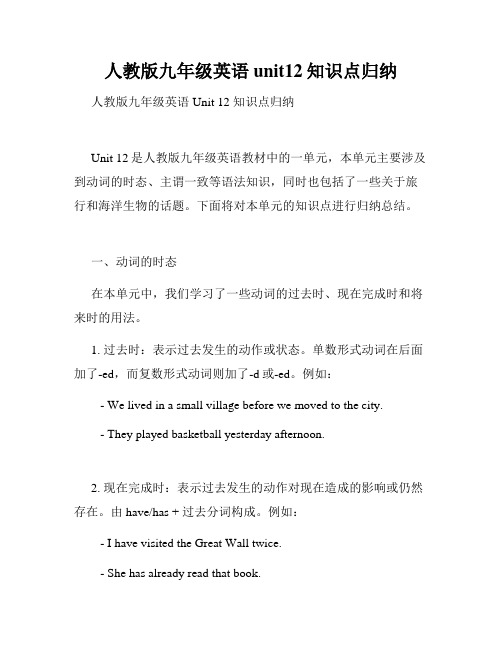
人教版九年级英语unit12知识点归纳人教版九年级英语Unit 12 知识点归纳Unit 12是人教版九年级英语教材中的一单元,本单元主要涉及到动词的时态、主谓一致等语法知识,同时也包括了一些关于旅行和海洋生物的话题。
下面将对本单元的知识点进行归纳总结。
一、动词的时态在本单元中,我们学习了一些动词的过去时、现在完成时和将来时的用法。
1. 过去时:表示过去发生的动作或状态。
单数形式动词在后面加了-ed,而复数形式动词则加了-d或-ed。
例如:- We lived in a small village before we moved to the city.- They played basketball yesterday afternoon.2. 现在完成时:表示过去发生的动作对现在造成的影响或仍然存在。
由have/has + 过去分词构成。
例如:- I have visited the Great Wall twice.- She has already read that book.3. 将来时:表示将来要发生的动作或存在的状态。
由will + 动词原形构成。
例如:- We will go to the beach tomorrow.- They will have a party next week.二、主谓一致主谓一致是指主语和谓语在人称和数上保持一致。
在本单元中,我们需要特别注意以下几点:1. 主语为第三人称单数时,谓语动词需要加-s或-es。
例如:- He often goes to the cinema on weekends.2. 表示时间、距离、金钱等的量词作主语时,谓语动词的单复数形式与它们代表的数量有关。
例如:- Ten yuan is enough to buy a drink.三、旅行话题在本单元中,我们学习了一些与旅行相关的词汇和句型,并通过对话的形式来进行实际应用。
人教版英语九年级全册单元unit 12 知识点+测试卷+思维导图
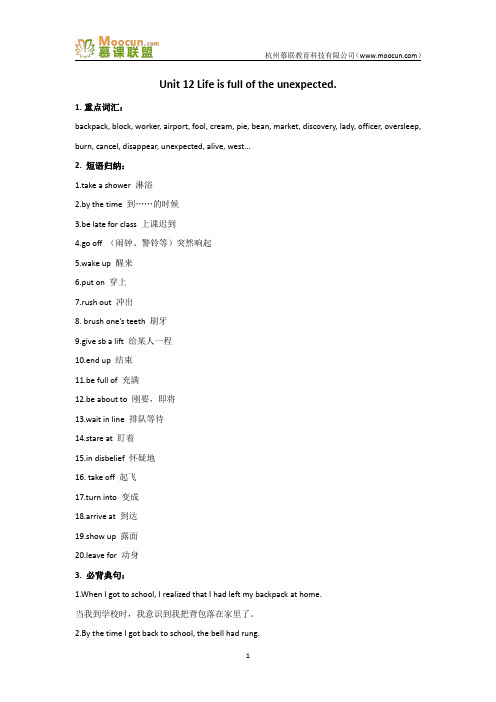
Unit 12 Life is full of the unexpected.1.重点词汇:backpack, block, worker, airport, fool, cream, pie, bean, market, discovery, lady, officer, oversleep, burn, cancel, disappear, unexpected, alive, west...2. 短语归纳:1.take a shower 淋浴2.by the time 到……的时候3.be late for class 上课迟到4.go off (闹钟、警铃等)突然响起5.wake up 醒来6.put on 穿上7.rush out 冲出8. brush one’s teeth 刷牙9.give sb a lift 给某人一程10.end up 结束11.be full of 充满12.be about to 刚要,即将13.wait in line 排队等待14.stare at 盯着15.in disbelief 怀疑地16. take off 起飞17.turn into 变成18.arrive at 到达19.show up 露面20.leave for 动身3. 必背典句:1.When I got to school, I realized that I had left my backpack at home.当我到学校时,我意识到我把背包落在家里了。
2.By the time I got back to school, the bell had rung.当我回到学校时,铃声已经响了。
3. Before I got to the bus stop, the bus had already left.在我到达公共汽车站之前,公共汽车已经开走了。
4. As I was waiting in the line with the other office workers, I heard a loud sound.当我和其他办公室工作人员在排队的时候,我听到了一个很大的声音。
人教版九年级英语第十二单元知识点总结
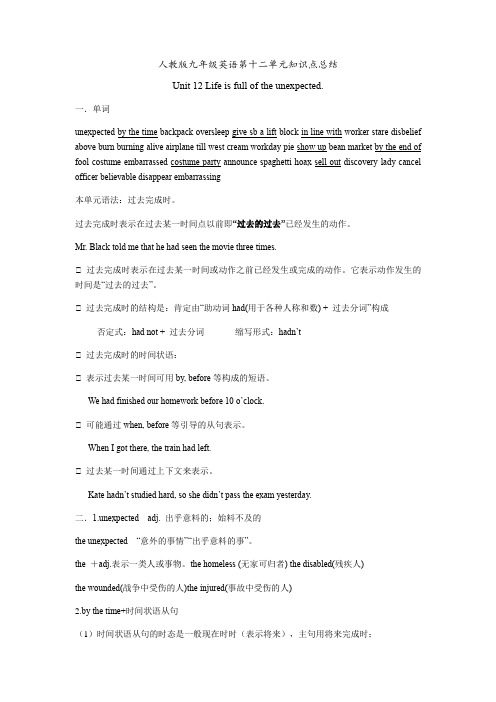
人教版九年级英语第十二单元知识点总结Unit 12 Life is full of the unexpected.一.单词unexpected by the time backpack oversleep give sb a lift block in line with worker stare disbelief above burn burning alive airplane till west cream workday pie show up bean market by the end of fool costume embarrassed costume party announce spaghetti hoax sell out discovery lady cancel officer believable disappear embarrassing本单元语法:过去完成时。
过去完成时表示在过去某一时间点以前即“过去的过去”已经发生的动作。
Mr. Black told me that he had seen the movie three times.⑴ 过去完成时表示在过去某一时间或动作之前已经发生或完成的动作。
它表示动作发生的时间是“过去的过去”。
⑴ 过去完成时的结构是:肯定由“助动词had(用于各种人称和数) + 过去分词”构成否定式:had not + 过去分词缩写形式:hadn’t⑴ 过去完成时的时间状语:⑴ 表示过去某一时间可用by, before等构成的短语。
We had finished our homework before 10 o’clock.⑴ 可能通过when, before等引导的从句表示。
When I got there, the train had left.⑴ 过去某一时间通过上下文来表示。
Kate hadn’t studied hard, so she didn’t pass the exam yesterday.二.1.unexpected adj. 出乎意料的;始料不及的the unexpected “意外的事情”“出乎意料的事”。
人教版九年级英语全一册十二单元语法与短语总结
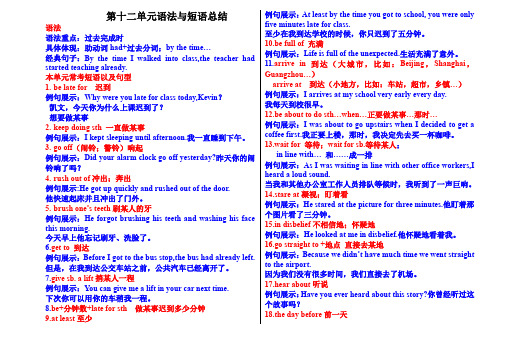
第十二单元语法与短语总结语法语法重点:过去完成时具体体现:助动词had+过去分词;by the time…经典句子:By the time I walked into class,the teacher had started teaching already.本单元常考短语以及句型1.be late for 迟到例句展示:Why were you late for class today,Kevin?凯文,今天你为什么上课迟到了?想要做某事2.keep doing sth 一直做某事例句展示:I kept sleeping until afternoon.我一直睡到下午。
3.go off(闹铃;警铃)响起例句展示:Did your alarm clock go off yesterday?昨天你的闹铃响了吗?4.rush out of冲出;奔出例句展示:He got up quickly and rushed out of the door.他快速起床并且冲出了门外。
5.brush one’s teeth刷某人的牙例句展示:He forgot brushing his teeth and washing his face this morning.今天早上他忘记刷牙、洗脸了。
6.get to 到达例句展示:Before I got to the bus stop,the bus had already left. 但是,在我到达公交车站之前,公共汽车已经离开了。
7.give sb. a lift捎某人一程例句展示:You can give me a lift in your car next time.下次你可以用你的车稍我一程。
8.be+分钟数+late for sth 做某事迟到多少分钟9.at least至少例句展示:At least by the time you got to school, you were only five minutes late for class.至少在我到达学校的时候,你只迟到了五分钟。
人教版九年级下册英语12单元知识点总结
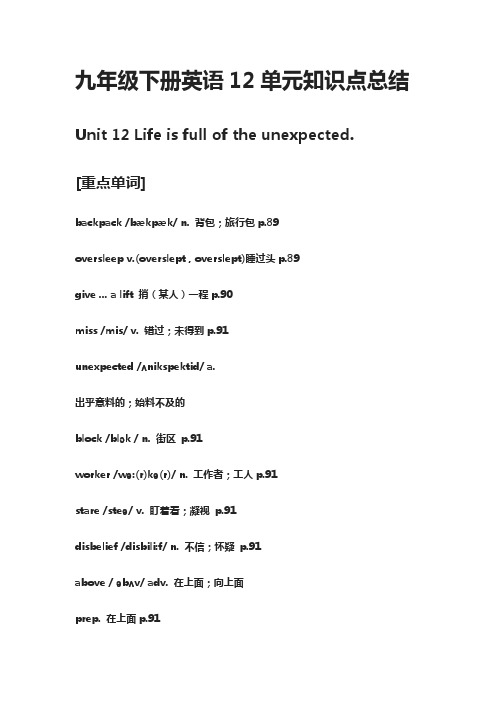
九年级下册英语12单元知识点总结Unit 12 Life is full of the unexpected.[重点单词]backpack /bækpæk/ n. 背包;旅行包p.89oversleep v.(overslept , overslept)睡过头p.89give ... a lift 捎(某人)一程p.90miss /mis/ v. 错过;未得到p.91unexpected /ʌnikspektid/ a.出乎意料的;始料不及的block /blɔk / n. 街区p.91worker /wə:(r)kə(r)/ n. 工作者;工人p.91stare /steə/ v. 盯着看;凝视p.91disbelief /disbili:f/ n. 不信;怀疑p.91above /əbʌv/ adv. 在上面;向上面prep. 在上面p.91burn /bə:(r)n/ v. (burnt /bə:(r)nt/, burned /;burnt, burned) 着火;燃烧p.91alive /əlaIv/adj. 活着;有生气的p.91take off(飞机等)起飞;匆忙离开p.91till /til/ conj. & prep. 到;直到p.91west /west/ adv. 向西;朝西adj. 向西的;西部的n.西;西方p.91 cream /kri:m/ n. 奶油;乳脂p.92boss/bɔs/ n. 老板;领导p.92pie /pai/ n. 果馅饼;果馅派p.92course /kɔ:(r)s/ n. 课程p.92bean /bi:n/ n. 豆;豆荚p.92market /ma:(r)kit/ n. 市场;集市p.92costume /kɔstju:m/ n.服装;装束p.93embarrassed /imbærəst/ adj.窘迫的;害羞的p.93announce /ənauns/ v. 宣布;宣告p.94spaghetti /spəgeti/ n. 意大利面条p.94hoax /həuks/ n. 骗局;恶作剧p.94discovery /diskʌvəri/ n. 发现;发觉p.94lady /leidi/ n. 女士;女子p.94officer /ɔfisə/ n.军官;官员p.94believable /bili:vəbl/ adj.可相信的;可信任的p.95 embarrassing /imbærəsiŋ/ a. 使人害羞的(难堪的或惭愧的)p.95 New Zealand /nju:zi:lənd/ 新西兰p.91Italy /Itəli/ 意大利p.94Mars /ma:(r)z/ 火星p.94Carl /ka:(r)l/ 卡尔(男名)p.90Orson /ɔ:(r)sən/ Welles /welz/ 奥森•韦尔斯p.94【重点短语】1. take a shower 淋浴2. leave my backpack at home 把背包忘在家里3. get back to school 返回学校4. start teaching 开始教学5. go off 响铃6. rush out the door 冲出房门7. give sb a lift 捎某人一程8. miss both events 错过两个事件9. be about to do sth 正要做某事10. stare in disbelief at 难以置信地盯着11. raise above the burning building 从正在燃烧的楼上升起12. jump out of bed 跳下床13. collect the math homework 收数学作业14. show up 赶到,出现【重点句型】1. By the time I got up, my brother had already gotten in the shower. 当我起床时,我哥哥已经进了浴室了。
九年级英语第12单元2b知识点
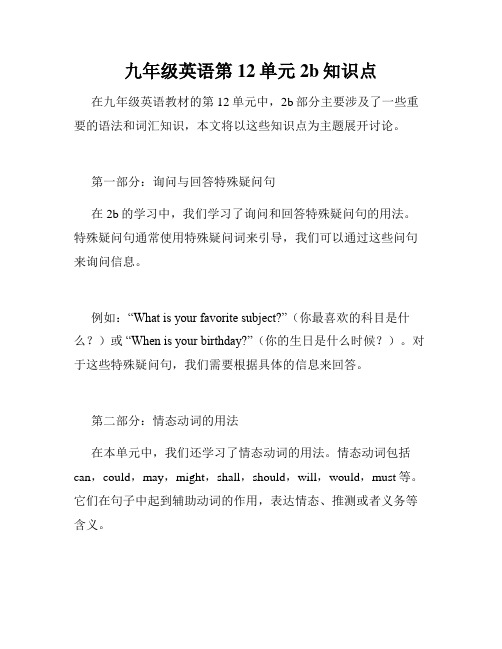
九年级英语第12单元2b知识点在九年级英语教材的第12单元中,2b部分主要涉及了一些重要的语法和词汇知识,本文将以这些知识点为主题展开讨论。
第一部分:询问与回答特殊疑问句在2b的学习中,我们学习了询问和回答特殊疑问句的用法。
特殊疑问句通常使用特殊疑问词来引导,我们可以通过这些问句来询问信息。
例如:“What is your favorite subject?”(你最喜欢的科目是什么?)或“When is your birthday?”(你的生日是什么时候?)。
对于这些特殊疑问句,我们需要根据具体的信息来回答。
第二部分:情态动词的用法在本单元中,我们还学习了情态动词的用法。
情态动词包括can,could,may,might,shall,should,will,would,must等。
它们在句子中起到辅助动词的作用,表达情态、推测或者义务等含义。
例如:“You can come to my party.”(你可以来参加我的派对。
)或者“He must be busy.”(他一定很忙)。
情态动词的用法具有一定的灵活性,因此在使用时需要注意上下文的适应。
第三部分:动词的时态在语法学习中,时态是一个重要的概念。
在九年级英语教材的第12单元中,我们复习了一些常用的动词时态,如一般现在时、一般过去时、现在进行时和将来时。
例如:“I often go to the park.”(我经常去公园。
)和“She is reading a book now.”(她正在看书。
)动词的时态在句子中起到表达动作发生时间的作用,因此我们需要根据具体的情况来选择适当的时态。
第四部分:介词的用法介词在语法学习中也是一个重要的知识点。
在2b的学习中,我们学习了一些常用的介词,如in,on,at等。
例如:“I will meet you at the park.”(我会在公园见你。
)介词可以用来表示时间、地点、方式等等。
在使用介词时,我们需要根据不同的场景来选择适当的介词。
最新人教版九年级英语第12单元重要知识点总结大全

最新人教版九年级英语第12单元重要知识点总结大全1. 单词和短语- 否定副词:never, hardly, seldom, rarely- 名词短语:a bunch of, a series of, a variety of, a source of- 形容词短语:fed up with, worried about, interested in, tired of2. 语法2.1 过去完成时- 表示在过去某一时间或事件之前已经完成的动作或状态。
- 构成:had + 过去分词。
2.2 宾语从句- 宾语从句用来充当动词或介词的宾语,说明它所作的动作或动作的对象。
- 引导宾语从句的连词:that, whether, if, when, where, why, how 等。
2.3 名词性从句- 名词性从句可以充当主语、宾语、表语或同位语。
- 引导名词性从句的连词:that, whether, if, what, who, whom, which, whose, when, where, why, how等。
2.4 定语从句- 定语从句用来修饰一个名词或代词,并且不能独立存在。
- 引导定语从句的关系代词:that, which, who, whom, whose。
3. 文化知识- 英国文化:英国人最喜欢的体育运动是足球,也称为英式足球。
英国还有伦敦塔、巨石阵等许多著名的文化和历史遗迹。
- 美国文化:美国四个最受欢迎的体育运动是足球、篮球、棒球和冰球。
美国有百老汇和好莱坞等著名的文化产业。
4. 阅读技巧- 阅读理解题:先通读全文,找出文章主旨,然后仔细阅读每一段,根据段落大意进行答题。
- 完型填空题:通读全文,理解上下文的意思,根据句子结构和语法规律进行填空。
- 词汇题:通过上下文的句子理解和推断词义,选择正确的词汇填空。
以上是最新人教版九年级英语第12单元的重要知识点总结。
希望对你有帮助!。
人教版九年级英语第十二单元知识点总结
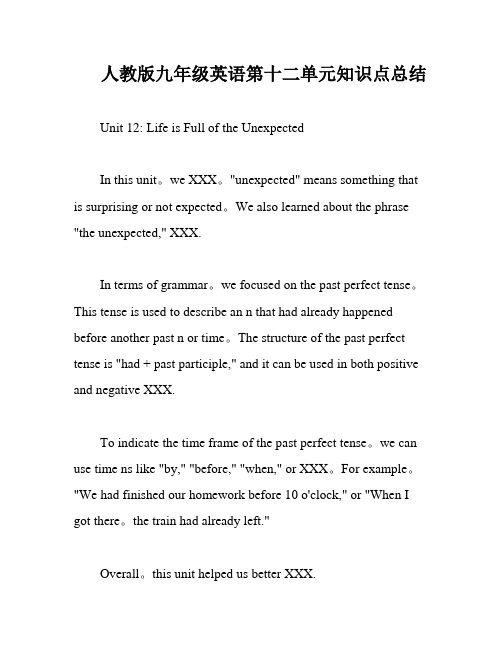
人教版九年级英语第十二单元知识点总结Unit 12: Life is Full of the UnexpectedIn this unit。
we XXX。
"unexpected" means something that is surprising or not expected。
We also learned about the phrase "the unexpected," XXX.In terms of grammar。
we focused on the past perfect tense。
This tense is used to describe an n that had already happened before another past n or time。
The structure of the past perfect tense is "had + past participle," and it can be used in both positive and negative XXX.To indicate the time frame of the past perfect tense。
we can use time ns like "by," "before," "when," or XXX。
For example。
"We had finished our homework before 10 o'clock," or "When I got there。
the train had already left."Overall。
this unit helped us better XXX.XXX XXX to those who have been injured in war。
人教版九年级全一册英语Unit12单元语法知识点总结
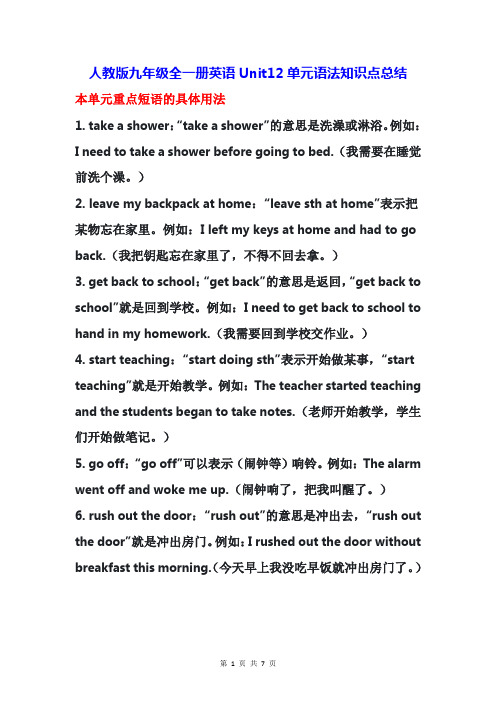
人教版九年级全一册英语Unit12单元语法知识点总结本单元重点短语的具体用法1. take a shower:“take a shower”的意思是洗澡或淋浴。
例如:I need to take a shower before going to bed.(我需要在睡觉前洗个澡。
)2. leave my backpack at home:“leave sth at home”表示把某物忘在家里。
例如:I left my keys at home and had to go back.(我把钥匙忘在家里了,不得不回去拿。
)3. get back to school:“get back”的意思是返回,“get back to school”就是回到学校。
例如:I need to get back to school to hand in my homework.(我需要回到学校交作业。
)4. start teaching:“start doing sth”表示开始做某事,“start teaching”就是开始教学。
例如:The teacher started teaching and the students began to take notes.(老师开始教学,学生们开始做笔记。
)5. go off:“go off”可以表示(闹钟等)响铃。
例如:The alarm went off and woke me up.(闹钟响了,把我叫醒了。
)6. rush out the door:“rush out”的意思是冲出去,“rush out the door”就是冲出房门。
例如:I rushed out the door without breakfast this morning.(今天早上我没吃早饭就冲出房门了。
)7. give sb a lift:“give sb a lift”的意思是让某人搭车、捎某人一程。
人教版九年级英语第十二单元2b知识点

人教版九年级英语第十二单元2b知识点九年级英语第十二单元2b知识点回顾九年级英语第十二单元2b知识点的回顾对学生来说是很重要的。
在这个单元中,学生学习了一些关于文化差异和沟通交流的重要知识。
本文将对这些知识点进行回顾和总结,帮助学生巩固并加深对这些知识点的理解。
在这个单元中,学生学习了关于文化差异的内容。
文化差异是指不同的文化背景下的不同生活习惯、价值观念和行为方式。
例如,在中国,人们礼貌地问候他人时会鞠躬,而在西方国家,人们通常会握手。
这种文化差异的存在使得我们在与不同文化背景的人交流时需要更多的理解和尊重。
同时,学生还学习了如何进行跨文化交流。
跨文化交流指的是在与不同文化背景的人交流时,要注意语言的使用、表达方式和礼仪等方面。
在英语学习中,学生需要了解英语国家的一些习惯和礼仪,以便更好地与英语母语人士进行交流。
例如,在英语国家,人们一般以"Hello"或"Hi"来打招呼,而不是像中国人那样说"你好"。
此外,学生还学习了一些英语国家的习惯,如生日礼物的选择和送礼的方式等。
除了文化差异和跨文化交流,学生还学习了如何表达自己的看法和感受。
在交流中,我们经常需要表达自己的想法、意见和感受。
因此,学生需要学会一些表达方式和句型,以便更好地传达自己的意思。
例如,当我们同意某人的观点时,可以说"I agreewith you.",而当我们不同意时可以说"I disagree with you."。
此外,还可以使用一些形容词来表达自己的情绪,如"I'mhappy/sad/excited/angry."等。
在学习这些知识点的同时,学生还需要进行大量的听说读写练习,以提高自己的语言能力。
学生可以通过多听英文音乐、看英文电影、阅读英文资料等方式来增强自己的语言素材,同时也可以多参与英语口语交流活动,提高自己的听说能力。
人教版九年级英语Unit12单词、课文知识梳理,词汇句式精讲
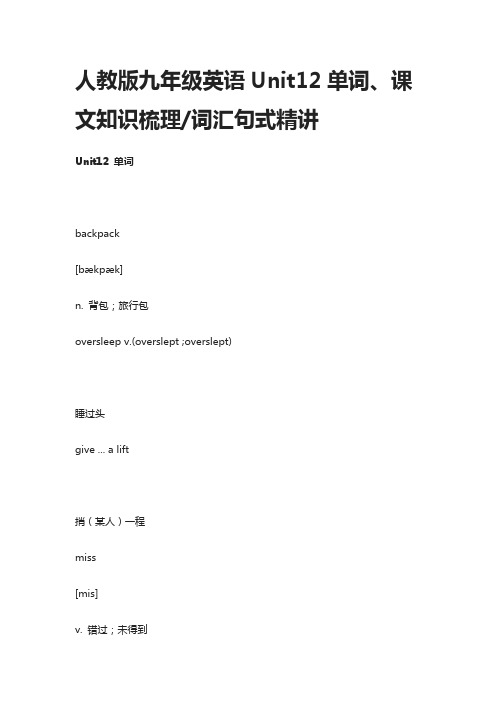
人教版九年级英语Unit12单词、课文知识梳理/词汇句式精讲Unit12 单词backpack[bækpæk]n. 背包;旅行包oversleep v.(overslept ;overslept)睡过头give ... a lift捎(某人)一程miss[mis]v. 错过;未得到unexpected[ʌnikspektid]a.出乎意料的;始料不及的block[blɔk ]n. 街区worker[wə:(r)kə(r)]n. 工作者;工人stare[steə]v. 盯着看;凝视disbelief[disbili:f]n. 不信;怀疑above[ əbʌv]adv. 在上面;向上面pre在上面burn[bə:(r)n]v. (burnt; burned ) 着火;燃烧alive[ əlaIv]adj. 活着;有生气的take off(飞机等)起飞;匆忙离开till[til]conj. & pre到;直到west[west]adv. 向西;朝西adj. 向西的;西部的n. 西;西方cream[kri:m]n. 奶油;乳脂boss[bɔs]n. 老板;领导pie[pai]n. 果馅饼;果馅派course[kɔ:(r)s]n. 课程bean[bi:n]n. 豆;豆荚[ma:(r)kit]n. 市场;集市costume[kɔstju:m]n.服装;装束embarrassed [imbærəst] adj.窘迫的;害羞的announce[ ənauns]v. 宣布;宣告spaghetti[spəgeti]n. 意大利面条hoaxn. 骗局;恶作剧discovery[diskʌvəri]n. 发现;发觉lady[leidi]n. 女士;女子officer[ ɔfisə]n.军官;官员believable[bili:vəbl]adj.可相信的;可信任的embarrassing[imbærəsiŋ]a. 使人害羞的(难堪的或惭愧的)New Zealand[nju:zi:lənd]新西兰Italy[Itəli]意大利Mars[ma:(r)z]火星Carl[ka:(r)l]卡尔(男名)OrsonWelles[ɔ:(r)sən; welz]奥森•韦尔斯Unit12 知识梳理【重点短语】1. take a shower洗浴2. leave my backpack at home 把背包忘在家里3. get back to school 返回学校4. start teaching 开始教学5. go off 响铃6. rush out the door 冲出房门7. give sb a lift 捎某人一程8. miss both events 错过两个事件9. full of unexpected 充满着不可预知性10. be about to do sth 正要做某事11. stare in disbelief at 难以置信地盯着。
人教版九年级英语第12单元知识讲解
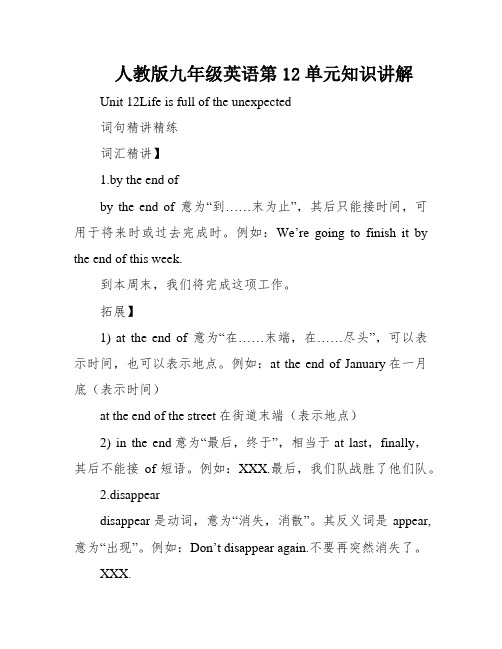
人教版九年级英语第12单元知识讲解Unit 12Life is full of the unexpected词句精讲精练词汇精讲】1.by the end ofby the end of意为“到……末为止”,其后只能接时间,可用于将来时或过去完成时。
例如:We’re going to finish it by the end of this week.到本周末,我们将完成这项工作。
拓展】1) at the end of意为“在……末端,在……尽头”,可以表示时间,也可以表示地点。
例如:at the end of January在一月底(表示时间)at the end of the street在街道末端(表示地点)2) in the end意为“最后,终于”,相当于at last,finally,其后不能接of短语。
例如:XXX.最后,我们队战胜了他们队。
2.disappeardisappear是动词,意为“消失,消散”。
其反义词是appear,意为“出现”。
例如:Don’t disappear again.不要再突然消失了。
XXX.一些植物因滥捕而接近灭尽。
A woman appeared at the end of the street.一位妇女出现在街道的尽头。
3.go offgo off意为“收回响声”。
比方:My alarm clock XXX’t go off.我的闹钟没有响。
XXX alarm went off.警铃骤然响起。
拓展】1)go off还有“离开,出发”等意。
例如:Do go off the main road。
or you’ll be lost.不要分开XXX,不然会迷路的。
2)go off还透露表现“蜕变”。
比方:This milk has gone off.牛奶变坏了。
4.XXX offXXX off意为“起飞”。
例如:When will the plane take off?飞机什么时候起飞?拓展】1) XXX off还可作“脱下”讲,反义词组为put on,意为“穿上”。
人教版九年级英语第十二单元Unit12知识点+习题
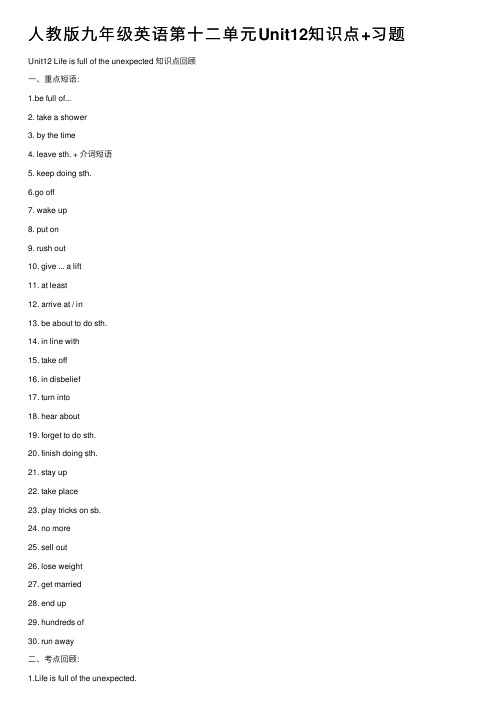
⼈教版九年级英语第⼗⼆单元Unit12知识点+习题Unit12 Life is full of the unexpected 知识点回顾⼀、重点短语:1.be full of...2. take a shower3. by the time4. leave sth. + 介词短语5. keep doing sth.6.go off7. wake up8. put on9. rush out10. give ... a lift11. at least12. arrive at / in13. be about to do sth.14. in line with15. take off16. in disbelief17. turn into18. hear about19. forget to do sth.20. finish doing sth.21. stay up22. take place23. play tricks on sb.24. no more25. sell out26. lose weight27. get married28. end up29. hundreds of30. run away⼆、考点回顾:1.Life is full of the unexpected.【解析1】be full of = be filled with充满,装满①Our life is ______________chances, but there are also a lot of challenges.(充满)②The box is_______________(装满) books.③On hearing the news, her heart was _____ gratitude.A.filled ofB. full withC. filled withD. fill with【2014辽宁丹东】—Look! Here comes Cindy! She is always full of .—So she is. because she takes a lot of exercise every day.A. knowledgeB. courageC. changeD. energy【解析2】unexpected adj. 出乎意料的;始料不及的the unexpected “意外的事情”“出乎意料的事”。
人教版英语九年级全册 Unit 12 知识精讲

人教版英语九年级全册Unit 12知识精讲Unit 12 Life is full of the unexpected.Section A1. By the time I got up, my brother had already gotten in the shower. 在我起床之前,我的兄弟已经在洗澡了。
本句为过去完成时态,表示在过去某一时间或动作之前已经发生或完成了的动作,即“过去的过去”。
构成:过去完成时由“助动词had + 过去分词”构成,其中had 通用于各种人称。
They had already had breakfast before they arrived at the hotel.与过去完成时连用的时间状语有:( 1 )by + 过去的时间点。
如:I had finished reading the novel by nine o'clock last night.( 2 )by the end of + 过去的时间点。
如:We had learned over two thousand English words by the end of last term.( 3 )before + 过去的时间点。
如:They had planted six hundred trees before last Wednesday.例:—We all went to the cinema except you last night. Why didn't you come?—Because I ______ that movie twice.A. have watchedB. had watchedC. was watchingD. would watch答案:B【解析】考查过去完成时的用法。
根据上下文可知:我昨晚不去看电影,是因为我以前看过了。
叙述的是“过去的过去”发生的事,故用过去完成时态,选B项。
Unit12(单元解读课件)九年级英语全一册(人教版)

是在不断发展、变
化的道理,培养学
生积极向上的心态
。
教材
语篇 形式
语篇内容
核心词汇 核心句型
1.进一步学会用had block,worker had done
done谈论过去发生
Section A 3a-3b
阅读文本
的事情,学会通过阅 读分析文章信息。
第2课时
2.通过阅读了解作者
,above,burn, alive,airport, till,west
1. 掌握本课时出现的生词和重 点词组。 2. 学会利用上下文语境找出相 关细节信息。 3.让学生明白事物是不断发展的, 生活充满不确定性。积极心态 的培养十分重要。
1. 掌握如何用目标语言描述难
学习理解 应用实践 学习理解 应用实践
迁移创新
0 4 课时内容解读
课时内容解读
第一课时Section A 1a-2d 课例展示
Section B 3a-self check
基于整个单元的学习,整合利用整个单元的
06
1a-2d 通过听说活动引入had done这一语言结构,并 01 借助主题图创设的语境,模拟生活情景,引导 学生开展初步的对话操练,倾听关于过去发生 的突发事件。
0 2 学情分析
学情分析
已有基础
在学习本单元之 前,学生已经学 习过现在完成时 ,也熟知一般过 去时态的意义和 用法,在这个基 础上我们可以更 好地学习过去完 成时。
存在问题
学生对过去完 成时的理解和现 在完成时的区分 还有一定的难度。 还没有完全掌握 如何用目标语言 讲述过去的事情
发展需求
学生需要巩固之前 所学的关于现在完 成时的知识,学会 讲述过去发生的事 情,清晰地认识到 生活的不确定性。 能够提升自己的心 理素质和突发事件 的应对能力。
人教版英语九年级上册Unit12 重点内容解析
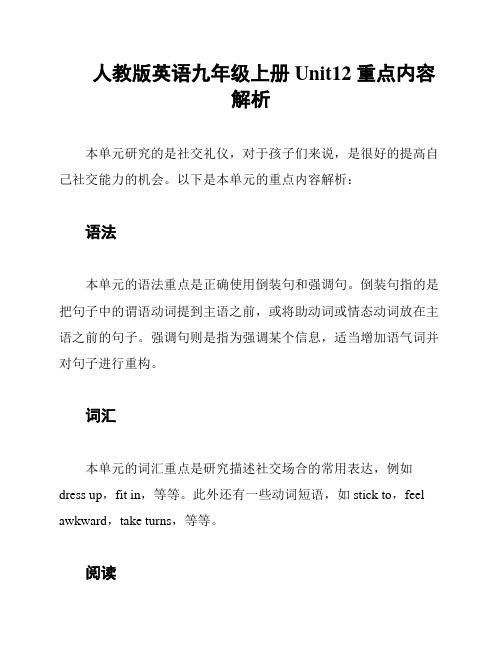
人教版英语九年级上册Unit12 重点内容
解析
本单元研究的是社交礼仪,对于孩子们来说,是很好的提高自己社交能力的机会。
以下是本单元的重点内容解析:
语法
本单元的语法重点是正确使用倒装句和强调句。
倒装句指的是把句子中的谓语动词提到主语之前,或将助动词或情态动词放在主语之前的句子。
强调句则是指为强调某个信息,适当增加语气词并对句子进行重构。
词汇
本单元的词汇重点是研究描述社交场合的常用表达,例如dress up,fit in,等等。
此外还有一些动词短语,如 stick to,feel awkward,take turns,等等。
阅读
本单元的阅读材料有两篇。
第一篇是一篇介绍中西方婚礼俗的文章,第二篇是一篇讲述两位男生如何参加一次正式的社交活动的故事。
阅读材料中涉及到了社交礼仪方面的知识以及一些地道表达用法,特别是第二篇材料。
写作
本单元的写作任务要求学生写一篇自我介绍信。
在这篇信中,学生需要表述自己的基本信息,以及自己的个人爱好和理想,并适当运用本单元的所学词汇和语法。
”
以上是本单元的重点内容解析。
通过本单元的学习,学生将能够了解和掌握在社交场合中的应对和交际技巧,并提高自己的英语运用能力。
- 1、下载文档前请自行甄别文档内容的完整性,平台不提供额外的编辑、内容补充、找答案等附加服务。
- 2、"仅部分预览"的文档,不可在线预览部分如存在完整性等问题,可反馈申请退款(可完整预览的文档不适用该条件!)。
- 3、如文档侵犯您的权益,请联系客服反馈,我们会尽快为您处理(人工客服工作时间:9:00-18:30)。
Unit 12 Life is full of the unexpected词句精讲精练【词汇精讲】1. by the end ofby the end of意为“到……末为止”,其后只能接时间,可用于将来时或过去完成时。
例如:We’re going to finish it by the end of this week.到本周末,我们将完成这项工作。
【拓展】(1) at the end of意为“在……末端,在……尽头”,可以表示时间,也可以表示地点。
例如:at the end of January在一月底(表示时间)at the end of the street在街道末端(表示地点)(2) in the end意为“最后,终于”,相当于at last,finally,其后不能接of短语。
例如:Our team beat theirs in the end.最后,我们队战胜了他们队。
2. disappeardisappear 是动词,意为“消失,消散”。
其反义词是appear, 意为“出现”。
例如:Do n’t disappear again. 不要再突然消失了。
Some animals are disappearing because of hunting.一些动物因滥捕而濒临灭绝。
A woman appeared at the end of the street.一位妇女出现在街道的尽头。
3. go offgo off 意为“发出响声”。
例如:My alarm clock didn’t go off. 我的闹钟没有响。
The alarm went off. 警铃骤然响起。
【拓展】(1)go off 还有“离开,出发”等意。
例如:Do go off the main road, or you’ll be lost.不要离开大路,否则会迷路的。
(2)go off 还表示“变质”。
例如:This milk has gone off. 牛奶变坏了。
4. take offtake off意为“起飞”。
例如:When will the plane take off? 飞机什么时候起飞?【拓展】(1) take off还可作“脱下”讲,反义词组为put on,意为“穿上”。
例如:Put on your clothes. Don’t take them off. 把衣服穿上,别脱下。
(2) 常见的含有take的词组:take turns轮流take away拿走take out拿出,取出take over接手,接管take notes 做笔记take care当心,注意take care of 照顾take photos 照相take it easy别紧张5. oversleepoversleep 意为“睡过头”,它的过去式和过去分词都是overslept。
例如:I overslept and missed the school bus. 我睡过了头,没赶上学校班车。
【拓展】某些词前缀over,表示“超过, 优越, 过度等”。
overage 过老的overtime 超出时间的overwork 过度工作overdo 做得过分I think the work is overdone. 我觉得这工作做过头了。
She overdressed herself today. 她今天打扮过头了。
6. leaveleave作动词,意为“离开(某处)”,常与for连用,后接要去的地方。
leave的过去式和过去分词都是left。
例如:He is leaving for Beijing next week. 他下周打算离开去北京。
Mr. Smith left the room at two o’clock. 史密斯先生两点离开房间。
【拓展】(1)leave还意为“离开(某人)的身边;离弃”。
例如:Her husband has left her. 她的丈夫把她遗弃了。
(2)动词短语leave something at/in +表示地点的名词,意为“把某物忘在某地”。
例如:I left my key at home. 我把钥匙忘在家里了。
Tom left his English book at school, so he didn’t do his homework.汤姆把英语书落在学校了,所以没有做英语作业。
(3) leave还意为“听任,使处于某种状态”。
例如:He left the windows open. 他让窗子开着。
【辨析】leave和forgetleave和forget两者都是动词,都含有“忘记”的意思。
表示把某物“落在某地方”用leave,如果无具体地点,则用forget。
例如:He said that he had left his book in the classroom.他说他把书落在教室里了。
I never forget her. 我永远也忘不了她。
7. show upshow up动词短语,意为“出席,露面”。
例如:Most of people in vited didn’t show up. 被邀请的人大部分还未到。
To my surprise, she failed to show up. 令我吃惊的是,她未能出席。
【拓展】show的常用短语:(1)show sb. around 带某人参观例如:I’ll show you around so that you can meet everyone.我会带你到各处看看,好让你和大家见见面。
(2)show off 炫耀例如:Those boys always show off their sports skills to the girls.那些男孩们老向女孩卖弄他们的运动技巧。
(3)show sb. sth. 把某物展示给某人看例如:My friend showed me a picture book.我的朋友出示我一本漂亮的图册。
(4)on show 陈列,展出例如:The photographs are on show at the museum until October.照片在博物馆展出到十月。
8. keep(1) keep用作及物动词,意为“保存;保留;保守”。
例如:Could you keep these letters for me, please?你能替我保存这些信吗?I’ll keep a seat for you. 我给你留个座位。
Can you keep a secret? 你能保守秘密吗?(2) keep用作连系动词,后常接表语形容词,意为“保持处于某种状态”。
例如:You must look after yourself and keep healthy.你必须照顾好自己,保持身体健康。
She knew she must keep calm. 她知道她必须保持镇静。
(3)keep的常用句型:1) keep doing sth. 意为“继续干某事”,表示不间断地持续干某事,后须接延续性的动词。
例如:He kept working all day, because he wanted to finish the work on time.他整天都在不停地工作,因为他想准时完成工作。
2)keep on doing sth. 意为“持续做某事”。
例如:The pupil kept on asking me the same question.这个学生不断地问我同一个问题。
例如:3) keep...from doing sth.意为“阻止/防止……做某事”。
例如:The heavy snow kept us from going out.大雪阻止了我们出去。
【词汇精练】I. 根据句意及首字母提示补全句子。
1. Set your alarm clock, and you won’t o_______.2. When I got to school, I r _________I had left my backpack at home.3. U__________, by the time I got there, the bus had already left.4. L__________, my friend Tom and his dad came by in his dad’s car and they gave me a ride.5. Sally i_________ me to her birthday party. It’s at her hous e on Saturday.6. In 1938, a radio program a________ that aliens from Mars had landed on the earth.7. Life is full of the u__________.8. He was going to meet me earlier but he didn’t s______ up when I got there.9. Jim d_________ and nobody heard of him.10. I’m really e___________ to be laughed in public.II. 用所给单词的适当形式填空。
1.I ______(stay)up last night and I am really ________now. ( exhaust )2. I ______ (wait) for the bus when she called me.3. I felt _______in that _______joke. ( embarrass )4. Scientists have to read the________ information in science books.(late)5. Do you know that your bike is _______ (break)?6. Don’t ______ (foolish) anyone in your class, because none of them are fools.7. My mother asked me to go the front door and check if it is _______ (lock).8. She told me she _______(be) to Sanya.III. 选用同义词填空。
